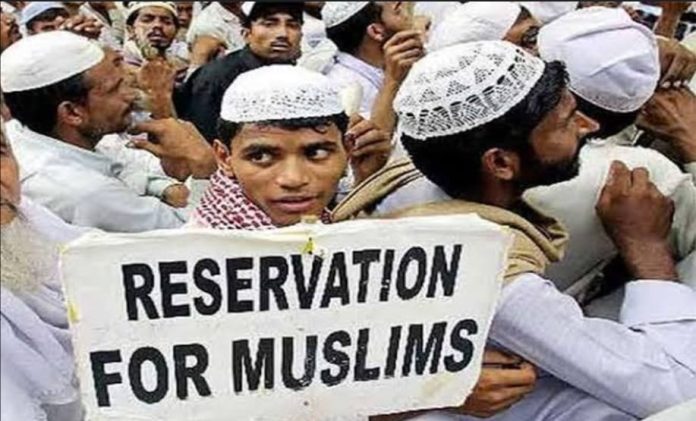In the lead-up to the 2024 Lok Sabha elections, Prime Minister Narendra Modi’s strategy of leveraging communal sentiments seemed to reach a tipping point, leading to unexpected consequences. Rather than rallying support, his divisive rhetoric sparked sympathy for the cause of Muslim reservations among influential political figures.
Traditionally, Modi’s attacks on Congress in relation to Muslims have been a recurring theme in Indian politics. However, during this election cycle, these tactics seemed to have lost their effectiveness. As public discourse shifted towards more pressing issues such as inflation, unemployment, and economic crises, Modi’s attempts to polarize the electorate against the Muslim population appeared increasingly out of touch.
One of the turning points was Modi’s speech on April 7, where he accused Congress of favoring minorities in cricket team selection, implying religious bias. This accusation not only surprised many Muslim cricketers, who had earned their positions based on merit, but also failed to resonate with the broader public. Additionally, Modi’s provocative language regarding Article 370 in Kashmir and the Ram Mandir issue in Ayodhya further alienated voters who were more concerned about substantive issues.
The fallout from Modi’s remarks was evident in the responses of prominent political figures. Chief Minister YS Jagan Mohan Reddy and Chandrababu Naidu pledged support for Muslim reservations, despite Modi’s opposition. Veteran politicians like Lalu Prasad Yadav and Sharad Pawar also condemned Modi’s communal rhetoric and advocated for Muslim reservations, emphasizing the importance of inclusivity in India’s societal fabric.
Adding to the discourse, actor-turned-politician Pavan Kalyan made noteworthy remarks supporting the reservation for Muslim minorities. His statements resonated with a significant section of the electorate, further amplifying the calls for inclusivity and social justice.
This shift in political dynamics underscores a broader trend towards prioritizing substantive issues over divisive identity politics. As public opinion turns against such tactics, there is growing recognition of the need for inclusive policies that address the concerns of all communities. Modi’s attempts to leverage communal sentiments may have backfired, but they have also highlighted the resilience of India’s democratic values and the importance of unity in diversity.
In addition to the political implications, it’s essential to consider the broader implications of this shift in discourse. It signals a maturation of Indian democracy, where voters are increasingly focused on issues that directly impact their lives rather than divisive rhetoric. Furthermore, it underscores the importance of political leadership that prioritizes inclusivity and social cohesion in a diverse society like India.
Overall, the 2024 elections have highlighted the complexities of Indian politics and the evolving dynamics of identity and governance. While Modi’s rhetoric may have failed to resonate with voters, it has sparked important conversations about the future of democracy and the role of inclusive policies in shaping India’s trajectory.
In a quaint tea shop in Agra, amidst the bustling preparations for the upcoming elections, a letter is being meticulously drafted addressed to Prime Minister Narendra Modi. The content revolves around a singular demand: a 9 percent reservation for Muslims within the existing 27 percent OBC quota. This aspiration echoes the sentiments of grassroots organizations like the Bharatiya Muslim Vikas Parishad, particularly advocating for the rights of poor Muslims.
Economically poor Muslims have long felt marginalized and excluded from mainstream opportunities. The fervent desire for representation in government jobs, educational institutions, and political spheres has intensified in recent times. While Prime Minister Modi’s outreach to the Muslim community initially raised hopes for job quotas, subsequent political maneuvers, such as the removal of OBC quotas in Karnataka and talks of ending reservations in Telangana, have left many disillusioned.
The political landscape leading up to the 2024 Lok Sabha and Assembly elections reflects a shifting narrative, with parties like Congress and Bharat Rashtra Samithi (BRS) promising to address the issue of Muslim reservations. However, amidst these pledges lies a backdrop of increasing marginalization and discrimination faced by the Muslim community, evident in policies such as the cessation of minority scholarships and budget cuts in the Ministry of Minority Affairs.
Within the Muslim community itself, there exists a spectrum of opinions regarding the path to achieving equitable representation. While some advocate for reservations based on religious identity, others propose population-based quotas or inclusion in Scheduled Caste lists. Grassroots movements, exemplified by organizations like Rashtriya Ulama Council, are mobilizing support for the inclusion of economically poor Muslims in the SC category, amplifying their voices through protests and advocacy efforts.
The discourse surrounding reservation has permeated educational institutions, igniting discussions and awareness campaigns among students. Individuals like Mohammad Waqar, a PhD student at Jamia Millia Islamia, are at the forefront of advocating for reservation as a means to address the systemic barriers faced by young Muslims in accessing education and employment opportunities.
The quest for reservation extends beyond mere political representation, encompassing broader socio-economic empowerment. The demand for a “quota within quota” model, advocated by leaders like Atif Rasheed, underscores the need for nuanced approaches to address the diverse needs of marginalized Muslim communities.
Despite the challenges and complexities inherent in the reservation discourse, there is a palpable sense of political awakening and solidarity among poor Muslims. The acknowledgment of their identity by political leaders, including Prime Minister Modi, has sparked hope for meaningful change and equitable representation.
As the conversation around Muslim reservations evolves, it reflects not only a quest for socio-political equity but also a redefinition of Indian democracy’s inclusivity and diversity. The journey towards realizing these aspirations may be fraught with obstacles, but it embodies the resilience and determination of a community striving for a more just and inclusive society.




